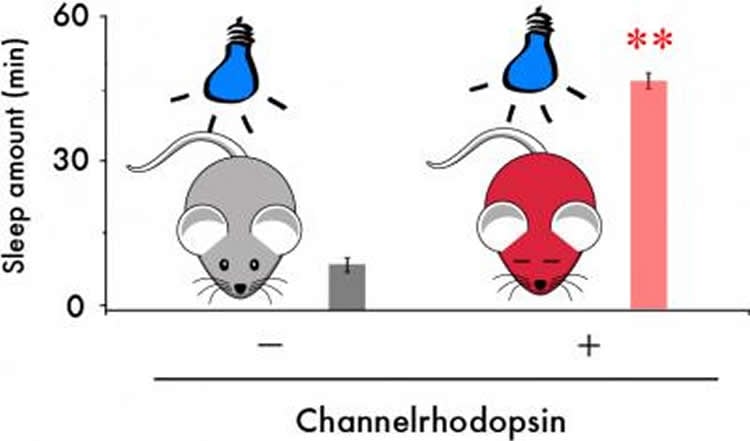Summary: According to researchers, the nucleus accumbens, an area of the brain associated with pleasure and motivation, can also promote sleep. Researchers believe the findings might help answer why we often fall asleep when we are bored.
Source: University of Tsukuba.
University of Tsukuba researcher discovers why we have the tendency to fall asleep in the absence of motivating stimuli.
Losing yourself in your favorite things without sleeping, or falling asleep during boring lectures — As humans, we often defy sleepiness and stay awake when attention is necessary, but also experience an inescapable desire to sleep in boring situations. The brain mechanisms governing the regulation of sleep by cognitive and emotional factors are not well understood. A new paper published in the journal Nature Communications finds that a part of the brain that is associated with motivation and pleasure – the nucleus accumbens – also can produce sleep. The new findings may explain why we have the tendency to fall asleep in the absence of motivating stimuli, i.e., when bored.
Researchers at the University of Tsukuba’s International Institute for Integrative Sleep Medicine (WPI-IIIS) and Fudan University’s Department of Pharmacology in the School of Basic Medical Sciences used chemo-genetic and optical techniques to remotely control the activities of nucleus accumbens neurons and the behaviors they mediate. As a result, the Japanese-Chinese team discovered that nucleus accumbens neurons have an extremely strong ability to induce sleep that is indistinguishable from the major component of natural sleep, known as slow-wave sleep, as it is characterized by slow and high-voltage brain waves.

“The classic somnogen adenosine is a strong candidate for evoking the sleep effect in the nucleus accumbens,” says Yo Oishi, the lead author on this project. Adenosine has long been known to represent a state of relative energy deficiency and to induce sleep via adenosine receptors. A specific subtype of adenosine receptors, the A2A receptors, are densely expressed in the nucleus accumbens. Caffeine, the most widely consumed psychostimulant in the world, produces its arousal effect also in the nucleus accumbens by blocking A2A receptors. Compounds that activate A2A receptors in the nucleus accumbens may open safe therapeutic avenues for treating insomnia, which is one of the most common sleep problems with an estimated prevalence of 10-15% in the general population and 30-60% in the older population.
Source: Masataka Sasabe – University of Tsukuba
Image Source: NeuroscienceNews.com image is credited to University of Tsukuba.
Original Research: Full open access research for “Slow-wave sleep is controlled by a subset of nucleus accumbens core neurons in mice” by Yo Oishi, Qi Xu, Lu Wang, Bin-Jia Zhang, Koji Takahashi, Yohko Takata, Yan-Jia Luo, Yoan Cherasse, Serge N. Schiffmann, Alban de Kerchove d’Exaerde, Yoshihiro Urade, Wei-Min Qu, Zhi-Li Huang & Michael Lazarus in Nature Communications. Published online September 29 2017 doi:10.1038/s41467-017-00781-4
[cbtabs][cbtab title=”MLA”]University of Tsukuba “Why Do We Fall Asleep When We’re Bored?.” NeuroscienceNews. NeuroscienceNews, 29 September 2017.
<https://neurosciencenews.com/sleep-boredom-7616/>.[/cbtab][cbtab title=”APA”]University of Tsukuba (2017, September 29). Why Do We Fall Asleep When We’re Bored?. NeuroscienceNews. Retrieved September 29, 2017 from https://neurosciencenews.com/sleep-boredom-7616/[/cbtab][cbtab title=”Chicago”]University of Tsukuba “Why Do We Fall Asleep When We’re Bored?.” https://neurosciencenews.com/sleep-boredom-7616/ (accessed September 29, 2017).[/cbtab][/cbtabs]
Abstract
Slow-wave sleep is controlled by a subset of nucleus accumbens core neurons in mice
Sleep control is ascribed to a two-process model, a widely accepted concept that posits homoeostatic drive and a circadian process as the major sleep-regulating factors. Cognitive and emotional factors also influence sleep–wake behaviour; however, the precise circuit mechanisms underlying their effects on sleep control are unknown. Previous studies suggest that adenosine has a role affecting behavioural arousal in the nucleus accumbens (NAc), a brain area critical for reinforcement and reward. Here, we show that chemogenetic or optogenetic activation of excitatory adenosine A2A receptor-expressing indirect pathway neurons in the core region of the NAc strongly induces slow-wave sleep. Chemogenetic inhibition of the NAc indirect pathway neurons prevents the sleep induction, but does not affect the homoeostatic sleep rebound. In addition, motivational stimuli inhibit the activity of ventral pallidum-projecting NAc indirect pathway neurons and suppress sleep. Our findings reveal a prominent contribution of this indirect pathway to sleep control associated with motivation.
“Slow-wave sleep is controlled by a subset of nucleus accumbens core neurons in mice” by Yo Oishi, Qi Xu, Lu Wang, Bin-Jia Zhang, Koji Takahashi, Yohko Takata, Yan-Jia Luo, Yoan Cherasse, Serge N. Schiffmann, Alban de Kerchove d’Exaerde, Yoshihiro Urade, Wei-Min Qu, Zhi-Li Huang & Michael Lazarus in Nature Communications. Published online September 29 2017 doi:10.1038/s41467-017-00781-4







